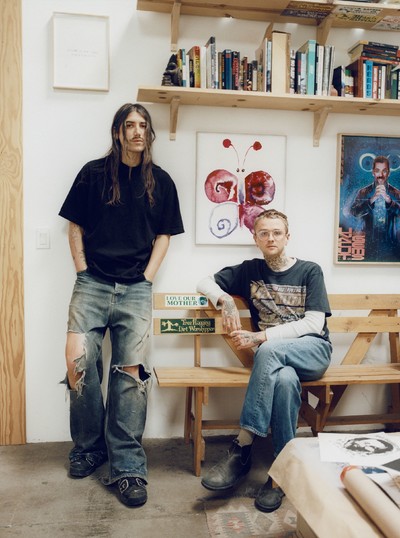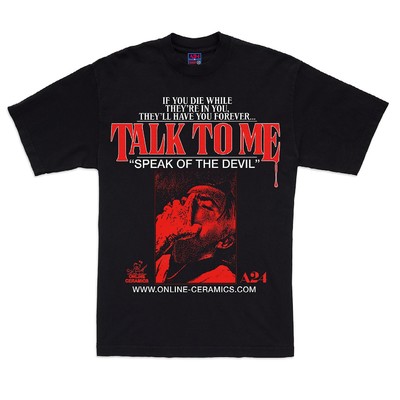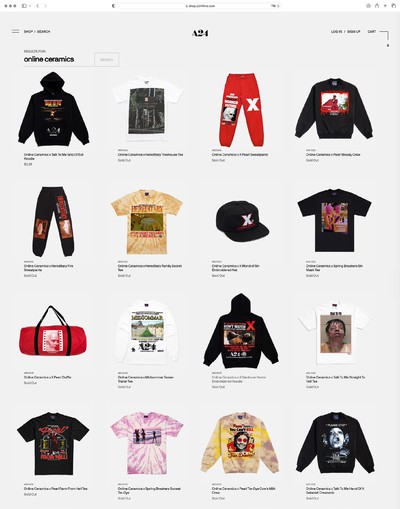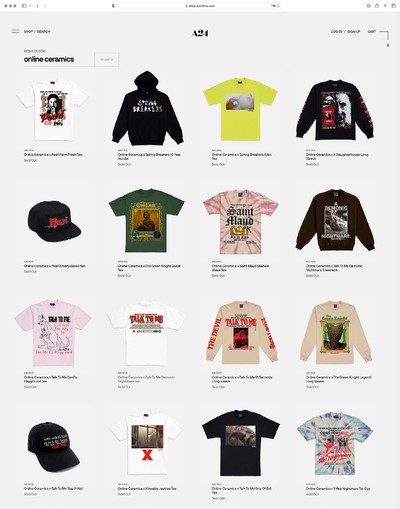Alix Ross and Elijah Funk, co-founders
By Sara McAlpine
Portrait by Kobe Wagstaff

Alix Ross and Elijah Funk, co-founders
Online Ceramics was not the brand we now know it as when it first partnered with A24. The California-based fashion label, founded by Alix Ross and Elijah Funk in 2016, had a modest reputation, known for its trippy tie-dye T-shirts chiefly related to the pair’s shared obsession with the Grateful Dead. However, since the duo’s first official collaboration with A24, in 2018, their success has seen them collaborate with the likes of Marc Jacobs, The North Face, and Casio, while still using fashion as the framework to express their shared interests in everything that exists outside of it. They’ve collaborated with the estates of New Age spiritualist Ram Dass, and musicians Fela Kuti and Alice Coltrane, and continue to fuse trippy and cheerily macabre motifs in their standalone collections. Having met at the Columbus College of Art and Design, starting a clothing brand wasn’t Ross and Funk’s primary goal. That was to create art, wearing the subjects of their fandom on their sleeves – one of which, naturally, given their smiley spin on the spooky and subversive, is horror films. That’s how Online Ceramics’ relationship with A24 began – unofficially, at least. The official co-sign came after Ross and Funk had already designed T-shirts for Ari Aster’s film Hereditary. They’re now fully integrated into the A24 fold, designing collections for X, Saint Maud, Midsommar, Pearl, and more.
How did your relationship with A24 officially come about?
Alix Ross: One thing that I had always dreamed of was making T-shirts for movies, or making merch for movies, and I remember seeing the trailer for Hereditary when it aired at Sundance [in 2018], and scrambling to find a contact. We tried every way, and it was kind of a lost cause. Then when the film was close to coming out, Elijah and I decided, ‘We’re just going to make bootlegs of the movie merch and hope we don’t get sued.’ Luckily, our friend Will Welch, the editor of GQ, realized we were trying to reach out, and connected us to Zoe [Beyer], A24’s creative director. By some miracle, she knew who we were. So, we sent her what were going to be the bootlegs for Hereditary, and she was down for it. That was it: ‘Let’s do it.’ Zero oversight, just, ‘Here’s a higher-res image instead of a screenshot.’
What was the turnaround time?
Alix: A week or two before the film was released. We work with very quick turnarounds. Any time you see us drop anything, the likelihood is that we were designing that stuff 24 hours before. But A24 is always down for that every time we go into a job. It’s always tight. They’ll come to us and say, ‘You guys have one week’, and they know we’re still going to make it fly.
So, how do you and A24 decide which projects to create products around?
Alix: They’re always keeping in touch about what’s coming up and seeing if we have interest in certain projects. It’s very much a question of, ‘Do you want to do this?’ And we’ve never turned anything down. Then when it comes down to us actually doing a project, they’re so open to our ideas.
‘Full transparency, we’ve done quite a few collections without even a screener. We’ve just watched the trailer and thought, ‘Okay, we get the vibe with this, seems cool.’’
When they come to you a week or two ahead of a film’s launch, what are they coming to you with? Is there a creative brief? Do you watch the films?
Elijah Funk: Full transparency, we’ve done quite a few collections without even a screener. We’ve just watched the trailer and thought, ‘Okay, we get the vibe with this, seems cool.’ I kind of like that we have that reactive relationship where we’re kind of going in blind on both sides sometimes. It keeps it fresh and exciting. One of my favourite things about what we’ve done the whole time is the challenge – especially when we’ve worked with musicians and artists – of creating IP around something. Essentially, fan art; that’s what makes me feel satisfied. I can’t tell you how many times we’ve gotten assets from a movie and not used the logo. Part of the fun of doing this is – for lack of a better phrase – catching a vibe and creating art that feels appropriate and makes sense, or pushing it in different directions. So, a lot of the times when we work with A24, it will be like, ‘Send us whatever you want.’ I think that’s what they like about us. Anyone could just drop the logo and a photo on a T-shirt and call it a day. Oftentimes, we’ll even make up the copy for the T-shirts; we’ll create taglines and things. It just creates a whole different atmosphere around it.
To go back to your decision to approach A24, you could’ve just put out the T-shirts you’d already designed, but you were still pushing to make it a formal partnership. Why?
Alix: At the time, as a business, we were starting to get press and we had just got into Dover Street Market. We were starting to become more of a crystallized thing. But for the most part, I feel like people assumed we were just hippies making tie-dye T-shirts; only into the Grateful Dead. I didn’t like the narrative that was starting to form, and I thought that maybe if we could officially work with A24, it would send a really clear message that there’s a darkness to Online Ceramics too, especially with Hereditary, because it’s such a dark film.
What do you think you’ve taken from your ongoing collaboration with A24?
Alix: I’m not very knowledgeable about the history of merch, and there’s been movie merch for a very long time, but I was not aware that a company like A24 would take merch so seriously. Before we started working with them, I knew they had been doing merch, but I saw our collaboration as being like a new twist on movie merch.
What was the response? Did you find it opened you up to a new audience of cinephiles and horror fans too?
Alix: I think that fans on both sides responded well, because it was kind of similar to how we reimagined Grateful Dead merch. Elijah applied his flyer design and T-shirt-making [skills] from his time playing in hardcore bands; applying that aesthetic to Grateful Dead-style merch. I feel like we tried to do something similar with movie merch in a way that felt new to me.
Elijah: When we were kids, I remember movie merch being actually really cool – weird Freddy Krueger and Chucky merch. I think something happened where the movie world got like… Marvel
movies. It just wasn’t very interesting or artful. Everything got really digital and rendered, but if you look back at old horror, or even just old VHS tapes and books, it’s this really graphic thing. We were like, ‘Oh, we could apply what the back of a VHS tape would look like in 1987 to Hereditary, and bring it into this contemporary lens.’
That brings me to the role of merch. You can look at it practically, maybe cynically, for a company as big as A24 as a valuable marketing tool. But in the context of your work, it’s been more linked to community and fandom. So, what does merch mean to you?
Elijah: At the end of the day, I just love art, music, movies, books. I’m just the biggest fan. Online Ceramics is our way to participate in things we really admire without just consuming them. I often feel like I’ve gotten to sneak in the back door of things that I really love and be a part of them. Merch can do that. And I love that a kid who works at the mall can save up and get one of our $50 T-shirts and feel like they’re a part of something. I like that it can be really participatory for everyone; it makes it a bigger project, rather than just ‘Here’s the movie, watch it and go home.’
‘When we were kids, weird Freddy Krueger and Chucky merch was really cool. Then something happened and the movie world got all… Marvel.’
You’re currently working on a book with A24. How did that come about?
Alix: The amount of stuff we’ve done with them has allowed them to come further into our world too, and this felt like a special opportunity to encapsulate our history together. The book is an oral history of [our company] Haunted Wagon, Inc., formatted similarly to how they do other books. Kind of Interview mag style, where we bring in cool people and collaborators to have conversations around the work we’ve done.
How do you think that fits into the wider world of A24; publishing a book that is as much about the collaborators as the specific work they do for each project?
Elijah: When we first came up with the concept, it was simply going to be a book about every T-shirt. When they proposed this storytelling element of our history, I was like, ‘I can’t even believe our favourite movie studio would entertain the idea of wanting to tell our story.’
How has your relationship affected the way you work as Online Ceramics? Has it impacted the scale of your business?
Alix: It’s been extremely helpful. I feel like, if we’re talking about fashion, A24 is basically perceived as a ‘fashionable’ brand, and it would be the same as having a really respected fashion house behind you. Without them, I’m certain that we would have figured it out, but it was the first thing that immediately started to build our world and show people what we were about. It has been critical to our success.
Elijah: What it created for us, as a business, can’t be understated. We were working from a small room, and then it’s like, ‘Okay, make Hereditary T-shirts…’ Well, how do we do that when all we have is a four-colour screenprinting press that we’re doing ourselves? Okay, so we’re going to outsource printing now, and we can print neck labels. We had advanced so quickly around what felt like a ‘do-or-die’ moment. I feel like we stuck the landing on it and have been running ever since.
For fashion brands in particular, film is another tool in communicating what they’re about. Has collaborating with A24 changed the way you think about communicating with your audience?
Alix: Definitely. I don’t know if we can make a film, but I think that’s a dream of ours at some point. Before working with them, it was very much like we saw the world expanding in our heads, but we didn’t know how to approach or do that. It’s helped us create or expand in a way that felt natural to us, letting us see what’s possible.
Elijah: We were already ‘fine artists’, thinking very dimensionally outside of T-shirts, and this felt like an offshoot art project that satisfied one part of artmaking. The relationship with them was a catalyst saying, ‘You guys can continue to make art in all of these directions.’ We can do photoshoots. We can do an art show. We can work on movies. We can still work with musicians. We can go down these different paths. We can start sub-brands about mushrooms, scary stuff, books, music, and create our own cinematic universe. You know, we do actually have the access now to not just make T-shirts, even though that’s currently our bread and butter and what we’re best known for.


